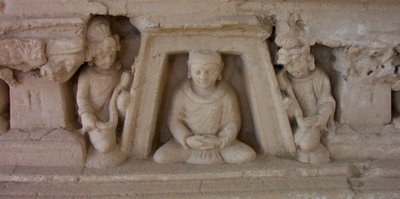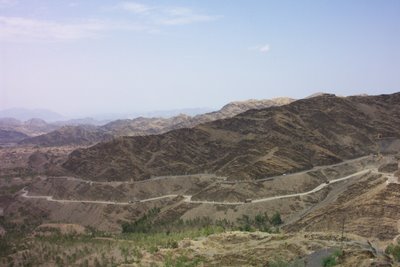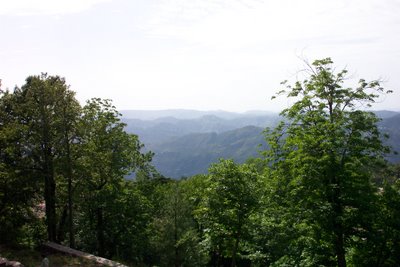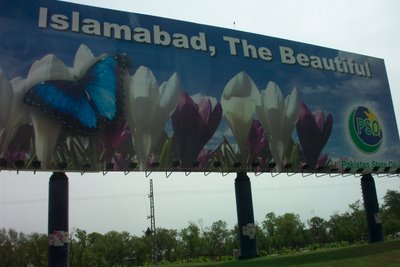The Motorway between Islamabad and Lahore is very nice. The arid terrain is reminiscent of the Southwest U.S. Unlike the U.S. Interstate system, however, the Pakistani Motorway has very little traffic and no billboards. The speed limit on the Motorway is about 75 mph and there are 3 lanes in both directions.
With one stop for gas, the drive took us 3 and 1/2 hours. Along the entire length of the Motorway, there were policemen observing traffic. They were either standing by the road or sitting in squad cars - either parked or slowly driving on the shoulder. This was a good thing for us because we were in Dennis's car and the engine was really knocking. He suspected that there was water in the gas tank. I know nothing about cars, so I could offer no better theory. In any case, there was a good chance we would break down, at which point a roadside cop would come in very handy.
As we approached Lahore, we paid the toll and left the Motorway. We didn't have a map and the exit sign just said Lahore, so we didn't know where we were going. Not 2 seconds after we had entered the city, we were stuck in the middle of a huge traffic situation. In Islamabad city limits, horses and tongas and push carts and all the rest are not allowed on the roads. In Lahore, anything goes. There were bikes and motorbikes and animals and buses and trucks and cars and carts and pedestrians everywhere. And everyone was honking, hardly anyone was moving, and the exhaust fumes were off the chart.
Dennis was driving, and he honked his way through the traffic. Then we turned around and tried a different road. It was less congested, so we stayed on this road and continued toward the city center. Eventually we parked at a gas station and called Dennis's friends to come lead us to their house.
Lahore is in eastern Pakistan, 30 kilometers from the Indian border. It is a bustling city of 3 or 4 million people, and there are hardly any Westerners there. As far as diplomatic missions go, I think the only Westerners in Lahore work at the American Consulate, and there are only a handful of them. Other than that, there are a handful of Westerners working in NGOs and on the local economy.

Dennis is a Filipino American, and he had been to Lahore before for work. He told me before we went that I would stick out like a sore thumb. When we asked for permission for our trip from the Consulate, the security officer told me the same thing. They were both right on the money, and I attracted no small amount of attention.
Getting back to the story, we didn't have to wait long at the gas station before Dennis's friends came and retrieved us. I think we had definitely made the right choice in having the friends come to us because I doubt we would have ever found their house on our own. The route was a bit convoluted.
Our hosts were a Filipino couple in their 60s. Leo, the husband was the quality control manager for a textiles plant. His factory had contracts for Gap, Polo/Ralph Lauren, Speedo, Old Navy, Nike, Tommy Hilfiger, and probably others I am forgetting. As part of the terms of these contracts, though, none of the products were allowed to be sold in Pakistan. Even so, Leo told us how every month there were over two thousand shirts "missing" from inventory. That's not counting pants, jackets, and the rest. So, it didn't matter that the items couldn't be legally sold in Pakistan; they were still walking out of the factory doors and onto the market.
Leo was also the central figure of the Filipino community in Lahore, so through him I was constantly meeting more of his countrymen.
His wife, Millet, had cooked a large spread of Filipino delicacies, so we had lunch and then hit the town. Leo and Millet also warned me that I was going to really stick out in town.
We started with a driving tour of the city with their driver, a Pakistani Christian named Joseph. The Filipinos all happened to have been very short, so I was selected to ride in the front seat for the leg room. Wherever we went, the locals were fixated on me. It was a weird thing - it made me feel kind of like a freak, kind of like a rock star.
The drive was interesting, but the warm sun on my face got the better of me. I fell asleep, and when I woke up we were parking at Lahore Fort - a large Mogul fort with courtyards and a wall and towers and whatnot. It took several minutes to get the car parked since the place was crawling with people and they were all walking in the road.
When we got to the ticket window, a hassle erupted. The prices were 10 rupees for kids (18 cents), 20 rupees for adults (35 cents), and 200 rupees for foreigners ($3.50). Joseph was local, and the 3 Filipinos were dark and Asian, so they also got through as locals. I was clearly a foreigner, and I was cool with paying the foreign charge. Leo wasn't cool with this, however. He was up at the window bargaining like a madman. And about 10 minutes later, we got inside - with 4 local tickets and one foreigner ticket.
As our group of 5 walked along, a crowd gathered around us. Everyone was staring at us, or at me to be more precise. Nobody was talking to me, though. Rather, the curious onlookers asked my companions questions about me. Then, some little kids ran up and tentatively shook my hand. After that, the gloves were off. Other people ran up to shake hands. Others rubbed my arms or touched my hair. People asked me to pose for pictures with them, which I did for the first two before I had to nip that in the bud. All of these jokers were like, "To hell with the fort, look at that white guy!" It was very odd to see a group like that with such limited exposure. It was such a shock for these people that even the beggars just stared. Thank goodness for that!
After a while, I could tell that Dennis was getting a little pissed at the whole circus that was following us around. It wasn't like we could get rid of them, though. As we walked along, I did see one other light-skinned guy who happened to be an old man. He didn't seem to be drawing any attention, so maybe they didn't think an old white guy was as interesting as a younger one. Or maybe he knew some way to instantly scatter a crowd.
I tried out my Urdu on some boys who were interested in having a conversation. They asked my name and when I told them, it reminded them of a famous cricket player. We switched to English, and I told them I didn't follow cricket. They asked where I was from. I told them I was from the U.S.A., and they were most impressed. Evidently WWF is quite popular in Pakistan. These kids were like, "Do you know the Rock?"
I responded, "I know of the Rock."
They obviously didn't understand what I meant because they started asking questions along the lines of whether the Rock was my friend and if I had ever fought him. Every time they would ask me anything, I would have to have them repeat. After a bit, they started laughing about how I didn't know English. And why not? Seeing as how it's my native language and not theirs, clearly my English was the problem.
Around this time, the fort was closing and the park rangers started blowing whistles so people would leave. We got back to the car and honked our way out. The road was so clogged with people we were literally nudging them out of the way with the bumper.
That night, we got invited to a party - a rowdy, chaotic affair. Actually, it was a first birthday party for a Filipino lad. It was held at a Chinese restaurant, and in attendance there were like 50 Filipino people, me, and 2 Germans. Most of the time, I just sat around while everyone else was engaged in animated conversations in Tagalog. Every few minutes, they would break out laughing, and someone would turn to me and explain what was so funny. If you've never had this experience, let me tell you that the joke is never as funny once everyone else is done laughing and someone is still explaining it to you. Plus, a lot of the jokes seemed to involve me marrying the daughters of the women at the table. It got a little tedious.
After the party, we hit some stores and called it a night.
The next day was our main shopping day. We got an early start - too early since the stores didn't open until 11:00 - so we went to tour a tomb. It was something similar to the Taj Mahal. We had the same hassle at the ticket window that we had had at Lahore Fort, and this time we ended up with 1 local ticket and 4 foreigner tickets. Leo was pissed.
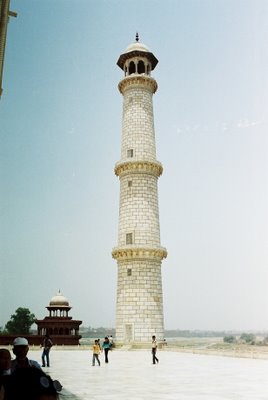
Pakistanis are not generally morning people, so the place was pretty dead and I was much less of a spectacle.
After we finished up at the tomb, we started a full day of shopping. Before we stepped into the first store, my companions practically ordered me not to say a word so that I wouldn't spoil any deals. They claimed that the vendors would jack up the prices right off the bat if I spoke. I didn't really think this would make a hill of beans difference, since whether I spoke or not, we were already destined to get the Westerner price. For their part, the Filipinos were telling everyone that they were Chinese. China borders Pakistan, and the two countries are friends.
We hit the bazaars and had a good haul. Even with the tourist mark-up, most of these vendors had a lower asking price than could be reached even after bargaining in Islamabad. Being a textiles expert, Leo was all over these guys. One guy was trying to sell us some "wool" blankets. Leo whipped out his glasses for a closer look, and this vendor didn't have a chance. Leo inspected the fabric, then smelled it, then looked some more, then tasted it (not really), and then put his glasses back in his pocket. Then he told the guy, "This is not wool. This is acrylic blend."
The guy knew he was busted, and suddenly the price was half. We didn't buy.
Millet is also a serious bargainer. Anytime anyone would tell her a price, she would give a long, dramatic "NOOOO". I know that's what you are supposed to do in bargaining, but she was cracking me up. The only bad part about the shopping was that one of the things we specifically came to buy was a special kind of local ceramics. The stores that had the good selections of it were all closed for the whole weekend for the Eid holiday. We would have to buy the ceramics on a different trip.
We had lunch at McDonald's. Islamabad didn't have a McDonald's at the time, so it was a big deal to have McDonald's in Lahore. I rarely eat at McDonald's in any country, but it is nice on occasion. If I had eaten this particular meal blindfolded, I don't think I would have been able to tell I wasn't eating Stateside. The taste was totally authentic. As we were eating, I also saw some of my Egyptian diplomat friends from Islamabad.
In Lahore, they take their fast food seriously. I think all the American chains that they have are McDonald's, Pizza Hut, Subway, KFC, and Dunkin Donuts, but there are several of each, and each one is huge - most are 3 stories tall.
That night at Leo and Millet's, we had screw drivers and slices of dried squid (which they tell me is the food for drinking in the Philippines) with some more Filipinos and a Jordanian man.
The next day was Sunday, and after church, we went to Dunkin Donuts with still more Filipinos. This time we went with five ladies, who just so happened to be the quality control team for the textile plant that manufactured Levis. They couldn't sell their products in-country either, but they took mine and Dennis's sizes in case they came across any production samples that would fit us.
Often times when I drink the night before, I don't do breakfast. On this day, I told my companions that I didn't want anything to eat, and I went to the bathroom. When I came back, there was this gruesome chicken sandwich covered with barbeque sauce waiting for me. We were at Dunkin Donuts, and they ordered these sandwiches for everyone (they must've missed the Donut part). In an amazing feat of mind-over-matter, I managed to choke the sandwich down. There were extra sandwiches for some reason, and they insisted that Dennis and I take them for our drive back to Islamabad. At that moment, Dennis and I both knew that those sandwiches were never coming out of that bag.
We returned to the house, and more visitors popped in. We had met them at the birthday party, so we were like one big family by now. Dennis and I said bye to Leo and Millet, bye to the other visitors, bye to the neighbors, and bye to the household staff. Several people invited us to stay with them on our next trip to Lahore. Others invited us to Christmas parties. Others invited us to the Philippines. Meanwhile, Millet was filling up an empty ice cream bucket with homemade macaroons. ¡Aye carumba! It was a wonder we ever got away.
I drove most of the way back, and a good deal of that was in the fast lane. In Pakistan, the fast lane is the passing lane, and you are not supposed to drive there except when passing. I didn't realize this at the time. Actually, this may also be the rule in the U.S., but no one follows it if it is. Anyway, we noticed a few of the policemen who were standing watch on the side of the Motorway flapping papers at us as we passed by. I guess that they were trying to pull us over, but we couldn't tell. We just drove on.
At the final toll booth, however, they caught us. The police along the road had radioed ahead about us, and an officer pulled us over when we got in the toll line. We shook hands with the cop, and he inquired about our families. We inquired about his family. All of our families were OK.
After the chit-chat the policeman started going on about how driving in the passing lane on the Motorway was a very serious offense. I told him that I was only using it for passing (which was true since I was going faster than most of the other traffic), but he continued harping about it.
We had diplomatic plates on the car, and the policeman knew it. He pulled out his ticket book, but he didn't write us up. He would start to write, then hesitate and lecture us some more, then pause, and repeat the process. I think that he was trying to provide us with an opportunity to offer him a few hundred rupees to make the problem go away. We didn't opt for bribery, though, and the cop gave us a final warning and allowed us to continue.
Twenty minutes later, I was home.
